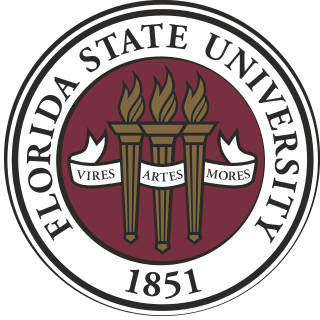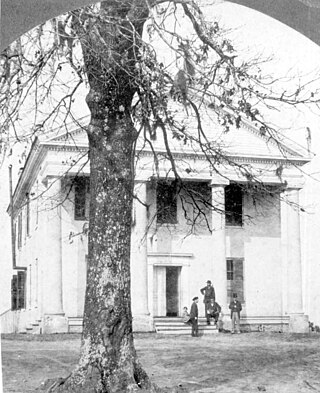
Tallahassee is the capital city of the U.S. state of Florida. It is the county seat and only incorporated municipality in Leon County. Tallahassee became the capital of Florida, then the Florida Territory, in 1824. In 2022, the population was 201,731, making it the eighth-most populous city in the state of Florida. The population of the Tallahassee metropolitan area was 385,145 as of 2018. Tallahassee is the largest city in the Florida Big Bend and Florida Panhandle region, and the main center for trade and agriculture in the Florida Big Bend and Southwest Georgia regions.

The University of Florida is a public land-grant research university in Gainesville, Florida. It is a senior member of the State University System of Florida. The university traces its origins to 1853 and has operated continuously on its Gainesville campus since September 1906.

Leon County is a county in the Panhandle of the U.S. state of Florida. It was named after the Spanish explorer Juan Ponce de León. As of the 2020 census, the population was 292,198.

Florida State University (FSU) is a public research university in Tallahassee, Florida, United States. It is a senior member of the State University System of Florida. Founded in 1851, it is located on Florida's oldest continuous site of higher education.

Florida Agricultural and Mechanical University (FAMU), commonly known as Florida A&M, is a public historically black land-grant university in Tallahassee, Florida. Founded in 1887, It is the third largest historically black university in the United States by enrollment and the only public historically black university in Florida. It is a member institution of the State University System of Florida, as well as one of the state's land grant universities, and is accredited to award baccalaureate, master's and doctoral degrees by the Commission on Colleges of the Southern Association of Colleges and Schools.

The Florida Institute of Technology is a private research university in Melbourne, Florida. The university comprises four academic colleges: Engineering & Science, Aeronautics, Psychology & Liberal Arts, and Business. Approximately half of FIT's students are enrolled in the College of Engineering & Science. The university's 130-acre primary residential campus is near the Melbourne Orlando International Airport and the Florida Tech Research Park. The campus is located 16 miles from Patrick Space Force Base.

The National High Magnetic Field Laboratory (MagLab) is a facility at Florida State University, the University of Florida, and Los Alamos National Laboratory in New Mexico, that performs magnetic field research in physics, biology, bioengineering, chemistry, geochemistry, biochemistry. It is the only such facility in the US, and is among twelve high magnetic facilities worldwide. The lab is supported by the National Science Foundation and the state of Florida, and works in collaboration with private industry.
Florida State University College of Law is the law school of Florida State University located in Tallahassee, Florida.
Innovation Park is the location of the National High Magnetic Field Laboratory, the Applied Superconductivity Center, Danfoss Turbocor and related advanced research facilities. The Leon County Research and Development Authority's Innovation Park is located near the campuses of Florida State University, Florida A&M University and Tallahassee Community College in Tallahassee, Florida.

The Herbert Wertheim College of Engineering is the largest professional school, the second largest college, and one of the top three research units at the University of Florida. The college was founded in 1910, and in 2015 was named in honor of Herbert Wertheim – a serial inventor, philanthropist and UF Distinguished Alumnus. Located on the university's Gainesville, Florida campus, the college is composed of nine departments, 15 degree programs, and more than 20 centers and institutes. It produces research and graduates in more than a dozen fields of engineering and science including: aerospace, agricultural, biological, biomedical, chemical, civil, coastal, computer, computer science, digital arts, electrical, environmental, industrial, materials, mechanical, nuclear, and systems.

The history of Florida State University dates to the 19th century and is deeply intertwined with the history of education in the state of Florida and in the city of Tallahassee. Florida State University, known colloquially as Florida State and FSU, is one of the oldest and largest of the institutions in the State University System of Florida. It traces its origins to the West Florida Seminary, one of two state-funded seminaries the Florida Legislature voted to establish in 1851.

The College of Arts and Sciences, the largest of the 16 colleges at Florida State University, contains the majors of nearly 11,000 students and is made up of 18 departments, nine interdisciplinary programs, and 14 centers, programs and institutes. Nearly 2,600 degrees are issued to graduates each academic year. There is currently a faculty-to-student ratio of 22:1 and 50 percent of the Arts and Sciences faculty and TAs teach nearly half of all credit hours. The college encompasses the fields of social sciences, liberal arts, mathematics, sciences and interdisciplinary studies. National and international recognition has been given to faculty for their teaching, research, and hard work to the profession. In addition, Martin Luther King Jr. Distinguished Scholar Awards, University Teaching and Advising Awards, and Developing Scholar Awards have been awarded to 125 faculty members at the Arts and Sciences college.
The Florida State University College of Education is one of sixteen colleges comprising the Florida State University (FSU). The College has roots that reach back to the West Florida Seminary and the State Normal College for Teachers. The College has a number of nationally ranked programs and is in the Top 20 nationally in terms of doctoral degrees awarded.
The Florida State University College of Nursing, is the nursing school of the Florida State University. About 553 students are enrolled in classes, including undergraduates and graduate students. All programs are accredited by the Commission on Collegiate Nursing Education.
Florida State University Panama City is located 100 miles (160 km) from the Tallahassee campus in Panama City, Florida. Established in 1982, the campus serves more than 4,000 students supported by 20 bachelor's and 9 graduate degree programs on campus and online.

The FSU Southwest Campus (SWC) of Florida State University (FSU) is located in Tallahassee about a mile to the southwest of the Main Campus on approximately 740 acres (3.0 km2) remaining out of a large parcel often called "The Farm", a nickname derived from a dairy farm that once operated on the site. Over the years portions of The Farm have been converted to other uses, such as housing, research, golf, mass media and academics.
The School of Engineering at Rutgers University was founded in 1914 as the College of Engineering. It was originally a part of the Rutgers Scientific School, which was founded in 1864. The school has seven academic departments, with a combined undergraduate student enrollment of over 2,400 students. It offers over 25 academic and professional degree programs. These include several interdisciplinary programs, such as Environmental Engineering with the Department of Environmental Science, and the graduate program in mechanics.
The College of Engineering at Michigan State University (MSU) is made up of 9 departments with 168 faculty members, over 6,000 undergraduate students, 10 undergraduate B.S. degree programs and a wide spectrum of graduate programs in both M.S. and Ph.D. levels. Each department offers at least one degree program, however many include more than one degree, multi-disciplinary programs, certifications and specialties as well as other degree programs affiliated with other colleges at Michigan State University.
The Irwin and Joan Jacobs School of Engineering is an undergraduate and graduate-level engineering school offering BS, BA, MEng, MS, MAS and PhD degrees at the University of California, San Diego in San Diego, California. The Jacobs School of Engineering is the youngest engineering school of the nation's top ten, the largest by enrollment in the University of California system, as well as the largest engineering school on the West Coast and the ninth-largest in the country. More than thirty faculty have been named members of the National Academies. The current dean of the Jacobs School of Engineering is Albert P. Pisano. The Jacobs School of Engineering sends a monthly news email which anyone can subscribe to.
Florida A&M University College of Law or FAMU College of Law is an ABA-accredited law school in Orlando, Florida, United States. It is part of Florida A&M University.













